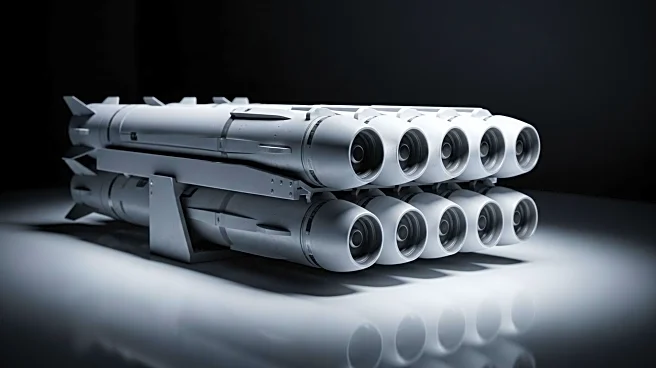What's Happening?
Russian forces have launched aerial attacks on Ukraine's second-largest city, Kharkiv, targeting a hospital and injuring seven people. This comes as Ukrainian President Volodymyr Zelensky prepares to meet
with President Trump in Washington to request additional military support. The attacks are part of a broader Russian campaign to disable Ukraine's power supply, affecting civilians during the winter months. Zelensky is seeking long-range weapons from the U.S. and Europe to counter these strikes, with discussions expected to focus on the potential provision of Tomahawk cruise missiles. President Trump has indicated a willingness to supply these missiles, which could escalate tensions with Russia but might also pressure Moscow into negotiations.
Why It's Important?
The provision of Tomahawk missiles to Ukraine could significantly alter the dynamics of the ongoing conflict. These sophisticated weapons would enhance Ukraine's ability to retaliate against Russian attacks, potentially leading to a shift in military strategy. For the U.S., this move could deepen diplomatic tensions with Russia, impacting international relations and security policies. However, it might also serve as leverage to bring Russia to the negotiating table, addressing President Trump's frustrations with Russian President Vladimir Putin's stance on peace talks. The decision could influence U.S. foreign policy and military aid strategies, affecting stakeholders in defense and international diplomacy.
What's Next?
President Zelensky's upcoming meeting with President Trump is crucial for determining the next steps in U.S. military support for Ukraine. If the U.S. decides to provide Tomahawk missiles, it could lead to increased military engagement and strategic shifts in the region. The decision may prompt reactions from NATO allies and other international partners, potentially leading to coordinated efforts to support Ukraine. Additionally, Russia's response to such a move will be closely watched, as it could influence future negotiations and the broader geopolitical landscape.
Beyond the Headlines
The potential provision of Tomahawk missiles raises ethical and strategic questions about military aid and its implications for international peace efforts. It highlights the complexities of balancing military support with diplomatic negotiations, as well as the long-term impact on regional stability. The situation underscores the challenges faced by global leaders in addressing conflicts while maintaining international security and cooperation.








